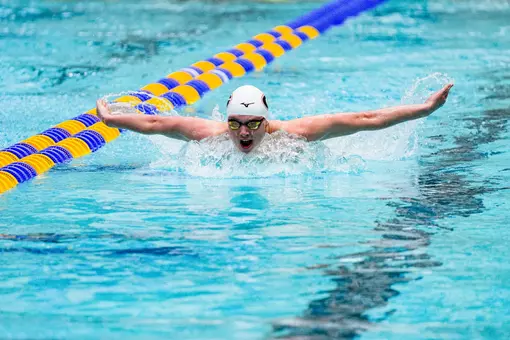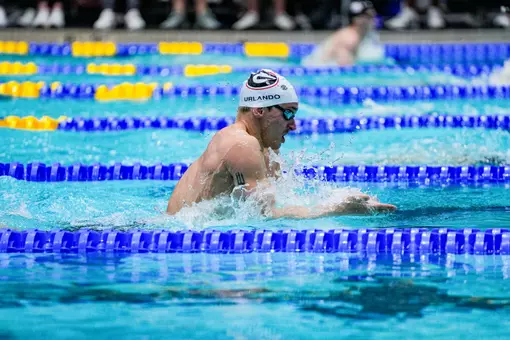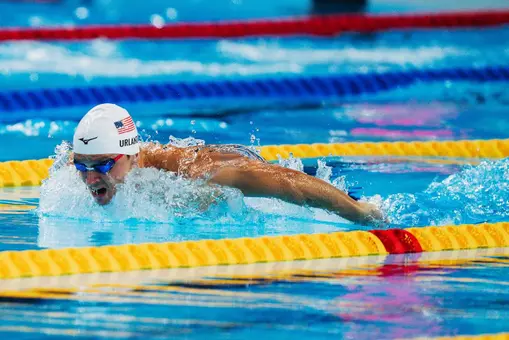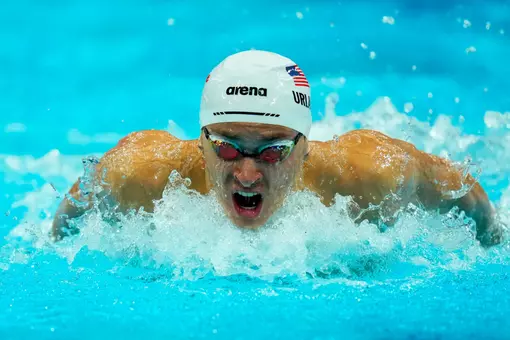University of Georgia Athletics
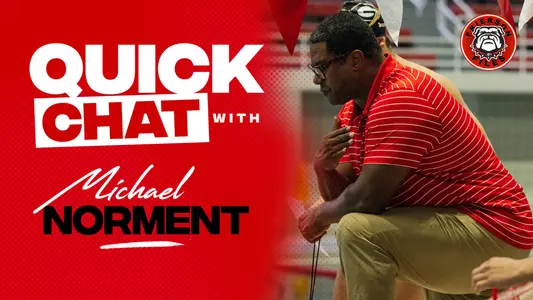
Quick Chat: Michael Norment
November 15, 2023 | The Frierson Files, Men's Swimming & Diving
By John Frierson
Staff Writer
When Michael Norment watched the swimming events during 1984 Olympics in Los Angeles, he was "captivated." He was a young boy growing up in New York, and he knew he wanted to be one of those swimmers one day.
Norment didn't quite make it to the Olympics, but the 1998 Georgia graduate had an outstanding career swimming for the Bulldogs and coach Jack Bauerle. He was a 16-time All-American, he won the SEC title in the 100-yard breaststroke as a freshman in 1994, and he did go on to swim for the United States in two Pan-Pacific Championships.
In May, after six years as an assistant coach at Georgia Tech, Norment returned to Athens as the Bulldog men's associate head coach. Norment and Georgia head coach Neil Versfeld worked together at Tech before first Versfeld and then Norment returned to UGA.
During a Quick Chat, Norment talked about his start in swimming, moving away from home to train, his favorite Bauerle story, and more. Here's some of what he had to say:
Frierson: I've always admired the level of commitment and discipline that swimmers have, as far as the two-a-days and all of the time in the pool that's required to compete at a high level. When did all of that start for you?
Norment: When I saw the 1984 Olympics, I was captivated. I wanted to swim, I wanted to make the Olympic team, and so when I got started at 9 or 10, I was serious about it. We didn't have double practices, but when I was 12, I made what was called an all-star meet for my zone. And when I went to that meet, I saw the fastest swimming that I'd ever seen in my life. And then I met a coach in Philadelphia, Jim Ellis, and he invited me down to swim in Philadelphia for the summer. And it was amazing. I'd never seen anyone training so hard in my life.
I was living in New York at the time, and moved back to New York and swam for a year, but then I asked my parents if I could move to Philadelphia to train with Jim. And they let me. When I turned 13, I was introduced to a new level of swimming — and I wanted to be a part of it.
Frierson: I can't imagine the level of maturity required to make that move and make the most of it. Did that make going off to college easier?
Norment: Just to give some background, this was 35 years ago. If you were a Black swimmer, you were kind of pigeonholed into swimming the 50 freestyle. Jim Ellis was a Black coach with a lot of Black swimmers swimming the 500, the 200; kids were making Junior Nationals, and we just didn't know about that. I think knowing that I was going to be developed was the reason for the move.
And to answer your question, it absolutely made going off to college easier. My mom couldn't move with us because she had a pension in New York, so my dad took a job with Temple University, just to live with me. We would commute back on the weekends to see my brother and my sister and my mom, and then we would go back and train during the week.
Frierson: Did you feel pressure to make all of that effort and disruption, if that's the right word, worthwhile?
Norment: That's the right word. I think at the time, at 13 or 14, I didn't really understand it. But I did understand it when I was about 16, and I was leaving to go back to Philadelphia, and my mom was crying. It's very difficult financially to maintain two households, in two of the most expensive cities in the country [laughs].
I saw how much my dad was sacrificing. At first it was a hindrance, because I was stressed out at every national meet that I went to. I actually told my parents not to come to the biggest meets because I was so stressed out. ... So the year that I won Junior Nationals, my dad wasn't there to see it. I think I had to do that; that was my way of making sure it was worth it for them.
Frierson: Do you have a favorite Jack Bauerle story that you can share?
Norment: I have a ton, but here's the story that really helps me understand the relationship that Jack and I have, and Jack's loyalty and commitment to people that he works with. I had graduated, I was a fifth-year, and I was training here to prepare for the 2000 Games.
We had a certain type of training and I got upset. I felt like we weren't doing to training that I felt like I needed. I stormed out of practice, I threw a temper tantrum, and Jack is an accomplished coach. I think I was jut frustrated that I wasn't hitting the marks that I wanted to.
Jack could have told me that if you don't like it, you can leave. And he didn't do that. He called me into his office and said, "Write down exactly what you want to do. Write down the training that you want. Write out exactly why and how you want to do it." This was after four years of being fully committed to doing every thing that he asked of me. ... It forced me to research, to study up on swimming and how energy systems work.
I put together this paper and presented it to Jack. I told him that I wasn't asking for less work, I'm just asking for this type of work. And Jack [laughs], who's been coaching for 30 years at that point, was like, "All right, we'll try it." He was able to give me that space, to give me a little bit of what I was asking for, and he didn't have to do that. It was an awesome experience with him, and we swam well that year.
As a coach, I carry that with me, as far as being malleable, being flexible and being open-minded with the swimmers that are dedicating their lives to this sport.
Frierson: Was that when you realized you might want to coach one day?
Norment: Absolutely. Absolutely.
(This Q&A was lightly edited for length and clarity.)
Assistant Sports Communications Director John Frierson is the staff writer for the UGA Athletic Association and curator of the ITA Men's Tennis Hall of Fame. You can find his work at: Frierson Files. He's also on Twitter: @FriersonFiles and @ITAHallofFame.

